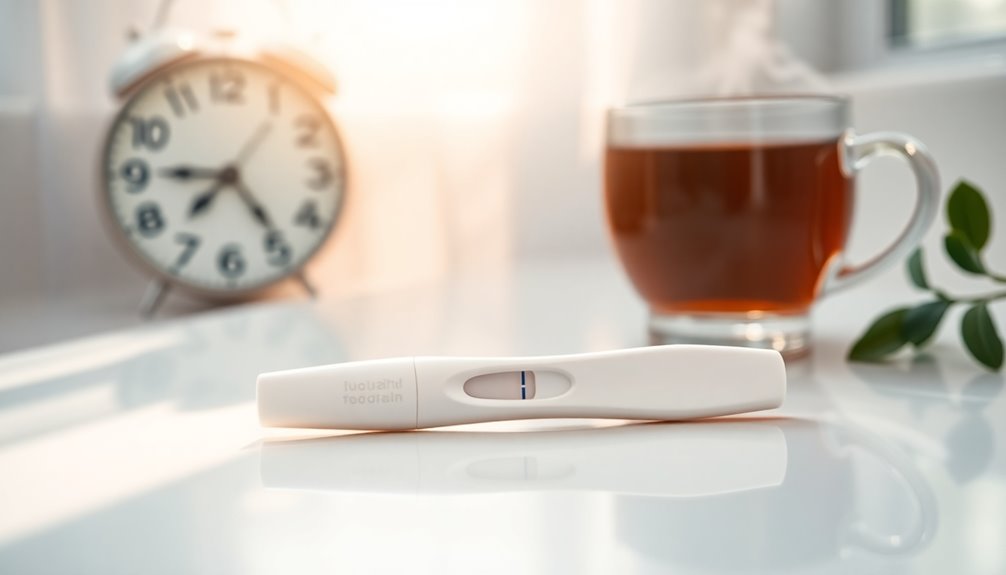You should wait at least 21 days after unprotected sex to take a pregnancy test for reliable results. However, it's even better to test on the first day of your missed period, which is about 14 days after ovulation. If you want to try testing earlier, some sensitive tests can detect pregnancy about 6 days before a missed period, though accuracy may drop. For the best results, use your first morning urine to get the highest concentration of hCG. Want to explore more about timing and test options? There's plenty to uncover!
Key Takeaways
- Wait at least 14 days post-unprotected intercourse for the most reliable pregnancy test results.
- Testing can be done at least 21 days after unprotected sex if your cycle is uncertain.
- Fertilization occurs within 24 hours of unprotected sex; implantation happens 6-10 days later.
- First morning urine increases test accuracy due to higher hCG concentration; avoid excessive water intake before testing.
- Retest if you receive a negative result but suspect pregnancy, especially if testing was done too early.
Timing for Pregnancy Tests
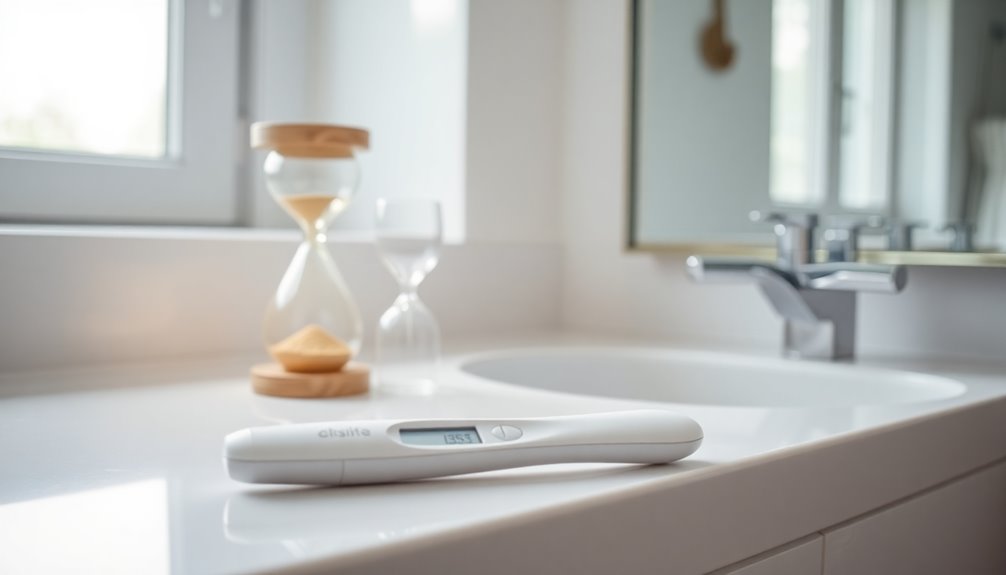
When it comes to timing for pregnancy tests, knowing when to test can make all the difference. Ideally, you should take a pregnancy test after a missed period, which usually occurs about 14 days after ovulation.
If you're uncertain about your cycle, consider testing at least 21 days after the last unprotected intercourse. Some sensitive home pregnancy tests can detect pregnancy as early as six days before a missed period, but keep in mind that accuracy may be lower, increasing the chances of false negatives.
For the most reliable results, wait until the first day of your missed period. It's best to use your first morning urine, as it contains a higher concentration of human Chorionic Gonadotropin.
Understanding Conception Timeline
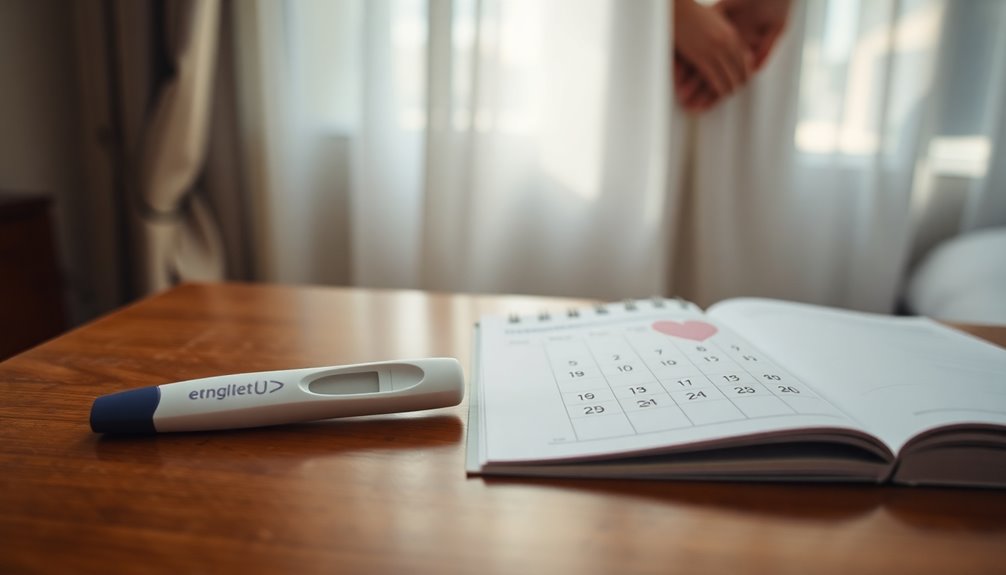
Understanding the conception timeline is key to knowing when you can test for pregnancy.
After fertilization, the fertilized egg takes about six days to reach the uterus and implant, which is essential for hormone release.
This process means you'll typically need to wait around two to three weeks after unprotected sex to get an accurate result from a pregnancy test.
Fertilization Process Duration
The journey to conception begins right after unprotected sex, as sperm race to reach and fertilize the egg, a process that can take up to six days.
Once fertilization occurs, the fertilized egg doesn't implant immediately; it needs a few more days to travel to the uterus. This is essential since implantation is significant for pregnancy to begin and typically happens 6-10 days after fertilization.
So, you're looking at a timeline of about 2-3 weeks from intercourse to a confirmed pregnancy. Understanding this duration can help you determine the best time for pregnancy testing, ensuring you're not testing too early to get an accurate result.
Knowing these days after fertilization can guide your expectations as you wait.
Implantation and Hormone Release
After fertilization, the fertilized egg begins its journey to the uterus, where it will implant itself into the uterine lining. Implantation usually happens within 6 to 10 days after fertilization. During this time, hormone hCG starts to be produced, which is essential for pregnancy test results.
| Day Post-Fertilization | Event | hCG Levels |
|---|---|---|
| 6 | Implantation begins | Low levels |
| 10 | Implantation complete | Rising hCG levels |
| 14 | Detectable hCG | Test recommended |
| 21 | Missed period | Accurate results |
If you take a test too early, you might see false negatives due to insufficient hCG. Waiting 2-3 weeks after unprotected sex guarantees you get accurate pregnancy test results.
Timeline for Testing
Knowing how long to wait for a pregnancy test can help you avoid unnecessary stress.
Conception usually happens within 24 hours after unprotected sex, but sperm can linger for up to 5 days. After fertilization, the fertilized egg takes around 6 days to implant in the uterus.
For pregnancy tests to detect hCG levels accurately, it's best to test at the right time—typically about 14 days after unprotected sex or from the first day of a missed period.
Testing too early can lead to a negative result, even if you're experiencing early pregnancy symptoms.
Factors Affecting Test Accuracy
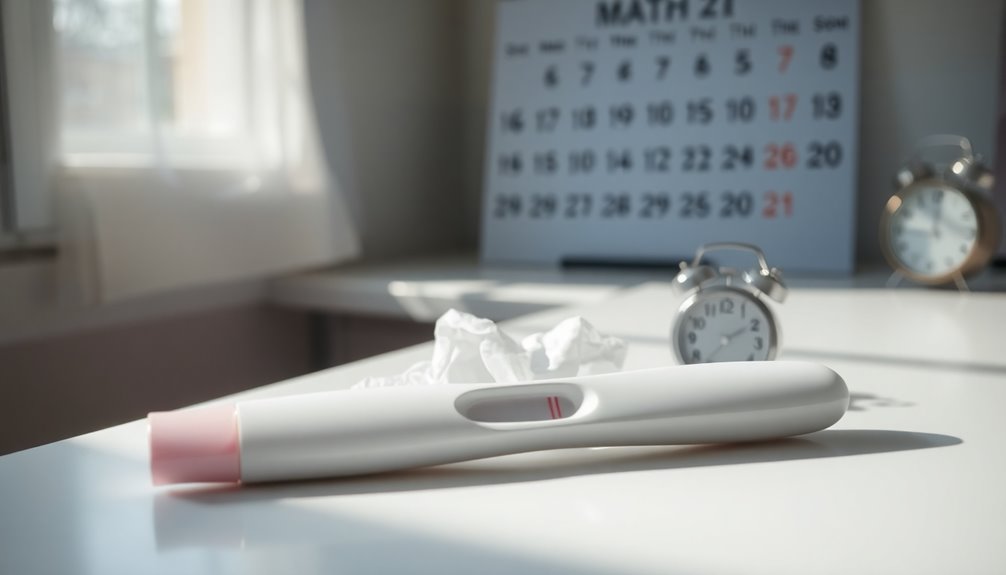
While the timing of your test plays a crucial role, various factors can also impact its accuracy. Here are some key considerations:
- hCG Levels: Testing too early may lead to false negatives since hCG levels need time to rise after conception.
- Missed Period: For the most reliable results, wait until after your missed period, typically around 14 days post-intercourse.
- First Morning Urine: Using your first morning urine can enhance test sensitivity, as it usually contains the highest concentration of hCG.
- Dilution: Excessive water intake before testing can dilute your urine, potentially affecting the detection of hCG.
When to Take a Test
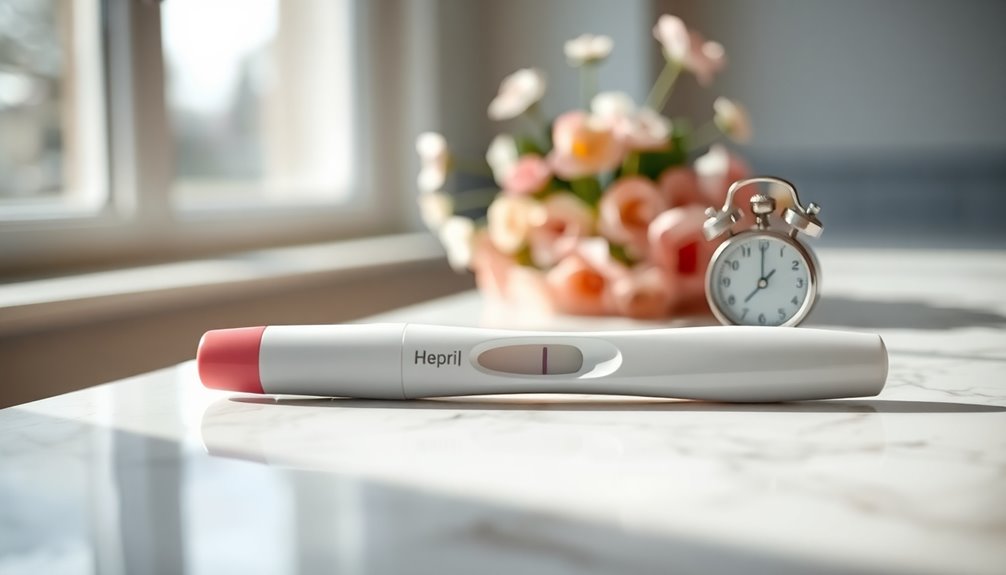
Timing your pregnancy test can greatly influence the result you get. Ideally, you should wait until the first day of your missed period, which is typically around 14 days after unprotected sex.
Some sensitive tests can detect pregnancy as early as six days before a missed period, but their accuracy is lower. If you test too early, you might face false negatives because hCG levels may not be high enough yet.
For those with irregular periods, it's best to wait at least three days after a missed period for clearer results.
If you get a negative result but suspect pregnancy, consider retesting a few days later to check for rising hCG levels.
Interpreting Test Results
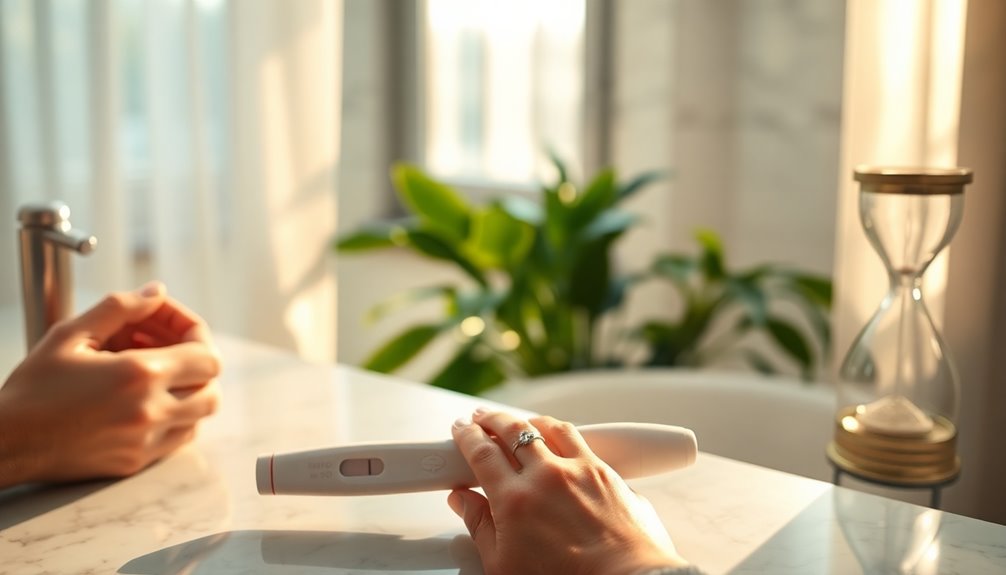
Interpreting your test results can feel overwhelming, especially if you're unsure of what the outcome means for your situation.
Here's a quick guide to help you understand your results:
- Positive Result: This typically indicates pregnancy. If you see this, it's a good idea to confirm with a healthcare provider.
- Negative Result: If you get this but suspect pregnancy, wait a few days and retest.
- Timing: Confirm you've waited at least until your missed period for the most accurate results.
- Factors Influencing Results: Diluted urine or certain medications can lead to false negatives, so consider these when interpreting your test.
When in doubt, consulting a healthcare provider can provide clarity and guidance.
Emergency Contraception Options
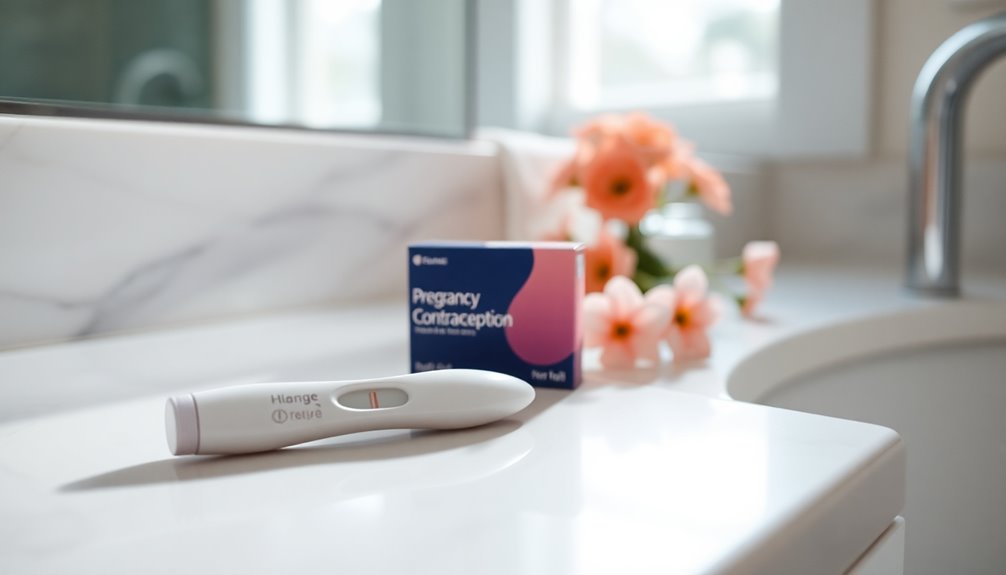
If you've had unprotected sex and are concerned about pregnancy, understanding your emergency contraception (EC) options can be essential.
You can take emergency contraception within 5 days after unprotected sex to effectively prevent pregnancy. Options include the morning-after pill, like Plan B, and the copper intrauterine device (IUD).
The sooner you take EC, the higher its effectiveness, as it primarily delays ovulation or prevents fertilization. Remember, it won't terminate an existing pregnancy.
If you experience a missed period after using EC, consider taking a pregnancy test to confirm your status. Consulting with a healthcare provider can help you choose the best EC option for your situation and address any potential contraindications.
Seeking Professional Guidance
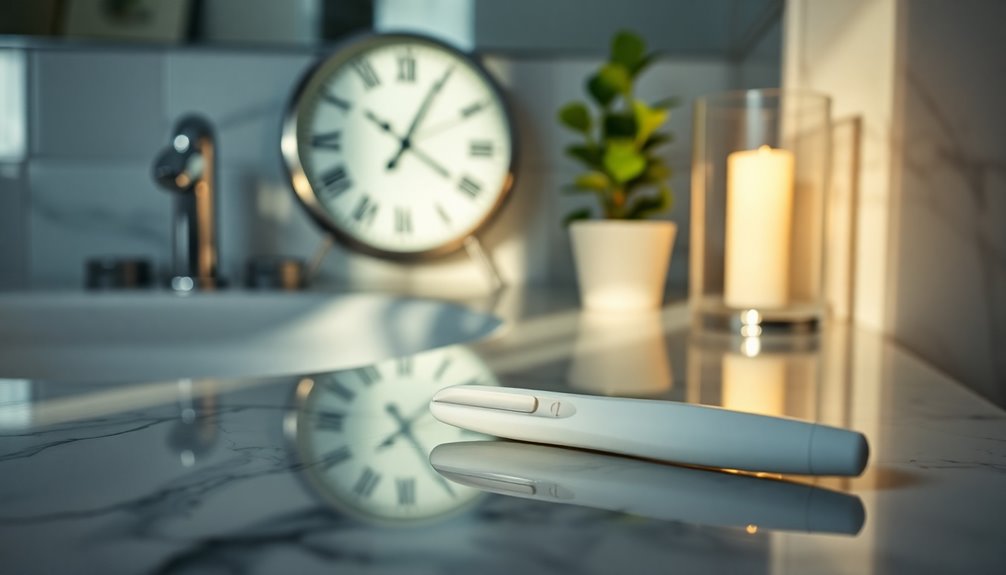
When you're uncertain about your pregnancy status, seeking professional guidance can be vital. Consulting healthcare professionals guarantees you receive accurate information tailored to your needs.
Here are some key reasons to reach out:
- Understanding Timing: Healthcare providers can help you determine the best timing for pregnancy tests based on your menstrual cycle and ovulation dates.
- Confirmatory Testing: If your test results are unclear, professionals can offer confirmatory testing for peace of mind.
- Personalized Advice: They provide personalized insights into your reproductive health and options.
- Emotional Support: Organizations like Planned Parenthood offer resources and confidential support for those questioning their pregnancy status.
Don't hesitate to consult experts for thorough guidance on your reproductive health journey.
Frequently Asked Questions
How Soon Will a Pregnancy Test Read Positive?
A pregnancy test can read positive as early as six days before your missed period, but those results mightn't be reliable.
For the most accurate outcome, you should wait until the first day of your missed period, when hCG levels are typically high enough to be detected.
If you test early and get a negative result, it's wise to retest a few days later, just to be sure.
How Many Days After Sex Can You Find Out if You're Pregnant?
You're keen to know if you're pregnant, but the answer isn't as straightforward as you'd hope.
Typically, you can find out if you're pregnant about 10-14 days after unprotected sex. This timeframe allows for implantation and the hormone hCG to build up in your system.
If you wait until the first day of your missed period, you'll increase your chances of getting an accurate result.
Patience can be tough, but it's worth it!
Can I Take a Pregnancy Test After 7 Days?
You can take a pregnancy test after 7 days, but it mightn't give you accurate results.
At that point, hCG levels may still be too low to detect, leading to a potential false negative. If your period hasn't started, it's a good idea to retest a few days later.
For the most reliable results, wait at least 14 days after unprotected sex to guarantee hCG is at detectable levels.
How Long After Sex Should I Wait for a Test?
If you're wondering how long to wait for a pregnancy test, it's best to hold off for about two weeks after unprotected sex.
This timeframe allows hCG levels to rise enough for accurate detection. If your cycle's irregular, consider waiting at least 21 days to avoid false negatives.
Testing too early can lead to misleading results, so if you suspect pregnancy but get a negative, try testing again a few days later.
Conclusion
So, whether you're waiting a week, counting days, or hoping for clarity, remember this: timing matters. Trust your instincts, take the test, and embrace the results—whatever they may be. Consider your options, seek guidance if needed, and know you're not alone in this journey. Your path forward can be filled with choices, support, and understanding. Stay informed, stay empowered, and take control of your reproductive health. You've got this!

